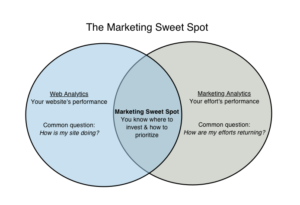Are you investing in the right Marketing efforts for your organization? Marketing Analytics means to collect, manage and study key metrics for determining the success and ROI of your Marketing strategy. Additionally, it helps you identify the key areas to improve.
Often, enterprises use the terms ‘analytics’ and ‘metrics’ interchangeably but, there is a slight difference. Marketing metrics refer to the data points while Marketing Analytics is the process of extracting relevant insights from the collected data that will drive revenue growth and boost business performance. It gives a clear picture to key stakeholders about the performance of the company’s Marketing efforts.
 Image Source: https://moz.com/blog/the-importance-of-marketing-analytics
Image Source: https://moz.com/blog/the-importance-of-marketing-analytics
Role of Marketing Analytics
If your lead generation campaigns are successful and your Sales team is kept busy with qualified leads, you are performing well. But, your work does not end here. You must measure and monitor the health of your Marketing campaigns. Detailed Marketing Analytics help enterprises to:
- Understand the current trends
- Determine the progress of each campaign
- Real-time monitoring
- Evaluate the ROI of each campaign
McKinsey & Co. finds that using Marketing Analytics enables enterprises to “measure proposals based on strategic return, economic value, and payback windows,”
Key Metrics
1. Website:
A company’s website is your prospective customer’s first touchpoint. You can measure the number of sessions, visitors, first-time visitors, page views, bounce rate, conversion rate, and average session duration.
2. SEO:
Is your SEO activity effective in achieving top ranks on key search engines? You may track organic traffic from SERPs, organic conversion rate, keyword ranking, and branded keyword searches.
3. Paid Ads:
Along with Click-through Rate (CTR) and Cost per Click (CPC) you may also track the conversation rate for paid ads and the cost per conversion. This strategy involves a huge investment to generate website clicks.
4. Blogs:
How many visitors does your blog attract daily? You can measure the performance of your blog through the number of blog visits, traffic sources, top viewed content, comments, average views per post and conversion rate.
5. Social Media:
Measuring the ROI of social media activities is tough if you are looking for organic traction. Key metrics to focus include: engagement rate (likes, comments, shares), audience growth and website traffic generated through social media.
6. Emails:
One of the most effective authentic tools of Marketing is Email Marketing. You can measure the success rate of your email campaigns by studying metrics like delivery rate, open rate, CTR, conversion rate and the number of opt-outs from the mailing list.
Best Practices
For effective Marketing Analytics, companies must adopt few best practices – mining high-quality data, tracking key metrics accurately, delivering real-time insights, using interactive dashboards, and leveraging the power of emerging technologies such as AI and Machine Learning.
Marketing Analytics does not only extract insights from data generated from multiple sources. It establishes a well-defined process of inferencing data and enables data-driven business decisions across the organization.
Read more: The 6 Questions You Should Be Asking Your Marketing Analytics Vendor











